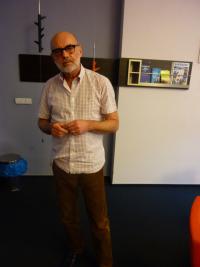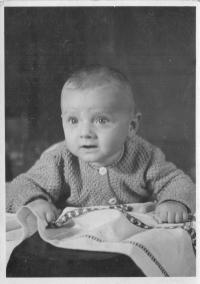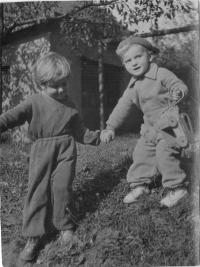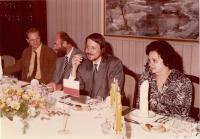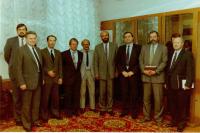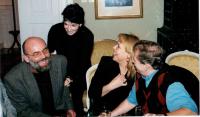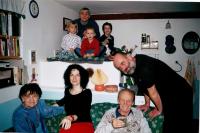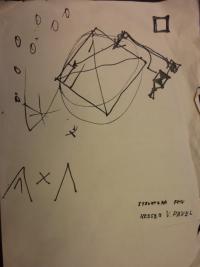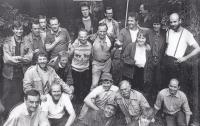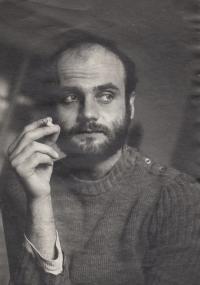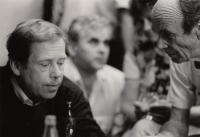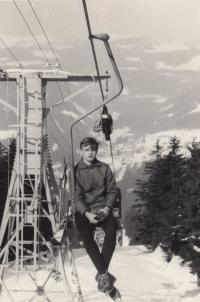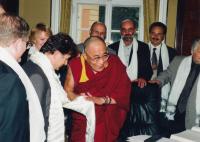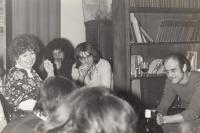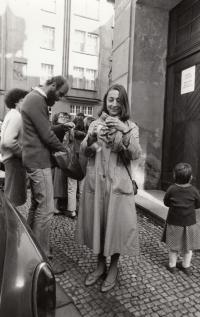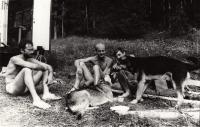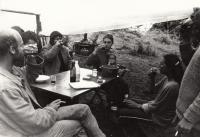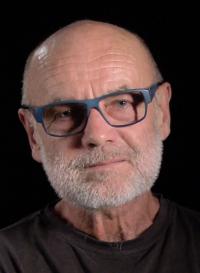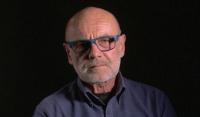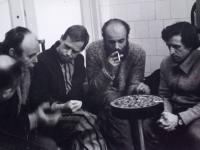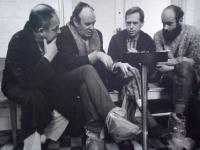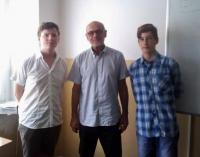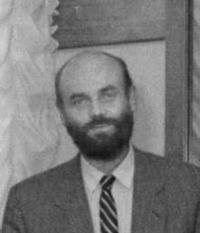A man is authentic even when he is not.
Jan Ruml was born on March 5th, 1953, in Prague – Podolí as the son of Czech communist journalist, later dissident, Charter 77 signatory, political prisoner and MP Jiří Ruml. In his early childhood, Jan Ruml lived with his family in Eastern Germany, where his father worked as a Czechoslovak Radio Radio and where Jan Ruml was a witness of bulding up the Berlin Wall (in August 1961). His parents example and experience of Russian invasion in 1968 determined his life of a dissident. After school-leaving exam in 1972, he applied for many different universities but, for political reasons, he was never enrolled. Therefore he started working in manual jobs (as a film laboratory technician trainee, gasworks labourer in Prague-Michle, logger in Kaplice, South Bohemia, bookseller in Melantrich publishing house, milker and boiler attendant). Jan Ruml was dismissed from Melantrich after signing Charter 77, which he was actively involved in (especially since he return to Prague in 1978). In Charter 77, he was one of coordinators, contact persons and distributors of self-publishing materials. Together with Petr Uhl and Jiří Němec, he built up a distribution channel of documents and exile literature within and across national borders, co-edited the self-publishing magazíne Spektrum, spread the bulletin Informace o Chartě 77, took part in Czech-Polish activities etc. In 1979, he organised the ´second wave´ of VONS (the Committee for the Defense of the Unjustly Persecuted) and coordinated courier truck delivery of exile documents between Prague and Palach Press Limited (publishing house in London). After denouncement and detention of one of the trucks by Czechoslovak Secret Police in April 1981, Jan Ruml, his father and six other dissidents were taken into custody for one year. When he was released, he continued with his dissident activities, only in summers of 1983 and 1984, he set out to Slovak mountains with his brother to graze heifers. Between 1987 and 1989, he was involved in self-publishing of Lidové noviny (newspaper), Originální videojournal and radically anticommunist political revue Sport. He became a member of HOS (Civil Liberty Movement), and was engaged in student discussion groups. At the same time, he was working as an ambulance man in the intensive care unit of Nemocnice pod Petřínem hospital, Prague (between 1987 – 1989). During the Velvet Revolution (on November 18th 1989), he set up Independent Press Centre with his friends from self-publishing circles. This first state independent press agency later transformed into Respekt, a well-known Czech weekly, whose first editor-in-chief Jan Ruml became. For a very short time, Jan Ruml was a speaker of Civic Forum and took part in its first negotiation with the communist government of Ladislav Adamec (on 21st of November 1989). Between December 1989 and June 1990, he worked in the informal ´influence group´ made up of people related to the president Václav Havel, government ministers, Civic Forum leaders and journalists. This group nominated Jan Ruml for the post of Deputy Minister of the Interior, where he worked from April 1990 to general election in June 1990. In his position, he was especially responsible for the dismissal of about 10 000 Secret Police officers, informal removal of Secret Police agents from high state offices and transformation of communist counter-intelligence into a democratically controlled intelligence service. In June 1990, Jan Ruml had a television speech against Dr Josef Bartončík, then leader of Czechoslovak People´s Party, and accused him of cooperating with Czechoslovak Secret Police and breaking his promise to president Havel that he was not going to stand for high state offices. Between 1992-1997 he was the Minister of Interior of the independent Czech Republic and between 1996 and 1998 the Member of Parliament. He was responsible for crucial steps in democratic transformation of the ministry, police forces and intelligence service. In Spring 1992, he joined Civic Democratic Party, where he played (apart from other thigns) the part of an informal ´mediator´ between the President Václav Havel and Prime Minister Václav Klaus. He supported general vision of the government, hovewer, he criticized its business technocracy and opposed some of its controversial steps, for example, the mode of privatizing Czech petrochemical industry. On 28th November 1997, together with the minister Ivan Pilip, he publicly called for resignation of the Civic Democratic Party leader Václav Klaus during his international visit to Bosnia because of the party black funding (the so-called ´Sarajevo Assassination´). On December Congress of Civic Democrats in Poděbrady, Jan Ruml stood for the post of a party leader. He lost, but set up a a new liberal party Unie svobody (Freedom Union), whose leader he became in January 1998. Jan Ruml also took part in the project of „Čtyřkoalice“, the coalition of four smaller political parties against the so-called Opposition Treaty trying to make constitutional changes in favour of two larger parties (Civic and Social Democrats). In 1998, he was elected the Senator for Čtyřkoalice in Prague 6 and since 2000, he also worked as Vice-Chairman of Senate for international affairs supporting democracy and human rights projects in authoritarian regimes (e.g. Olympic Watch or Civic Belarus). During the ´Television Crisis´ at the turn of 2000 – 2001, he put up in the building of Czech TV (together with journalist strikers) to prevent force invervention by public authorities. In 2004, he withdrew from politics, finished his legal studies and started working in business ethical counciling and projects of non-profit organisations. He shared his experience of Czech transition to democracy with Kuban students of American university in Miami. In 2006, he played a major part in saving Czech weekly Respect and he was appointed the chairman of its supervisory board for two years. At present, he is working as the CEO of SECAR Bohemia holding developing localization systems for protecting stolen vehicles. Since 2010, he has been an ordinary member of Green Party in Prague 2. He is married, has two sons and likes staying with his family in their cottage in South Bohemia.

